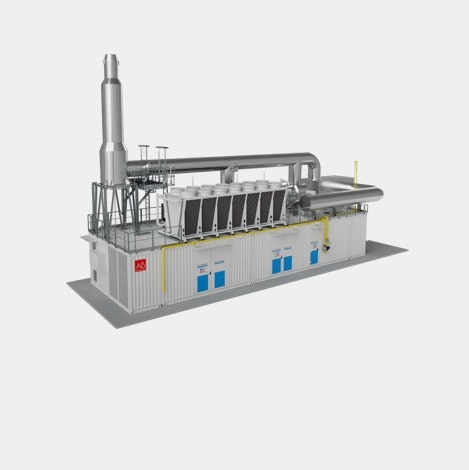Suitable for multiple industrial, tertiary and service sectors, cogeneration effectively responds to the needs of energy-intensive companies worldwide, characterised by high heat and electricity consumption. By simultaneously producing electricity and thermal energy from a single energy source within a single integrated system, cogeneration makes it possible to obtain the highest energy efficiency performance, with the advantage of being able to manage energy production continuously, reliably and safely. The Israeli market has recently opened up to cogeneration opportunities by encouraging the installation of local plants, in line with the country's energy transition objectives.
Israeli energy situation
Over the course of two decades, Israel has transformed from a country dependent on hydrocarbon imports to a net exporter of natural gas. 2022, in particular, was a year of strong growth for the Israeli energy sector. On the one hand, the country managed to reach an agreement on maritime borders with Lebanon, starting the exploitation of the Karish gas field and thus bringing new resources into the energy market. On the other hand, rising energy prices on global markets and growth in domestic production have allowed Israel to profit from the sale of the fuel.
Natural gas has taken on an increasingly prominent role in national consumption in the last decade. The discovery of the Tamar and Leviathan gas fields, respectively in 2009 and 2010, in particular, has contributed to a deep transformation of the Israeli energy sector. Between 2011 and 2021, against growth in national consumption of 8.2%, natural gas consumption grew by 148%, while coal and oil consumption decreased by 51% and 14% respectively.
Current state of cogeneration in Israel
Israeli industries are increasingly using natural gas as a substitute for the combustion of mazut, diesel, crude oil and liquefied petroleum gas (LPG) to produce heat for the processing and production of materials. Through on-site cogeneration plants, these industrial units are able to simultaneously produce electricity with natural gas and use the residual thermal energy, in the form of hot water and steam in their activities.
The use of natural gas in cogeneration has increased progressively, from 2013 (0.28 bcm) to 2018 (0.58 bcm), with triple-digit growth. In 2019, at least five industrial plants that used cogeneration were even able to sell excess electricity on the grid by occasionally playing the role of a "peaker", available to the grid during peaks in consumption.
Israeli cogeneration plants
Several Israeli industries have adopted cogeneration plants, with the dual objective of saving money, increasing performance and implementing an energy transition model.
The Primor plant in Gan Shmuel, for example, a leading brand in Israel in the production and marketing of fresh and chilled juices, has made an investment in energy efficiency, by installing a cogeneration plant. Gan Shmuel's project is of the BOT (build-operate-transfer) type, that is, it includes financing, design, installation and management of a plant that provides electricity and steam. The objective of the project is the energy efficiency and independence of the company and of the entire country. For this project, Gan Shmuel relied on AB Energy Israel, motivated by its reliability and professionalism.
A complete modular solution, the ECOMAX® model, has been installed in this plant. The unit includes all components necessary for the operation of the system, in accordance with the standards and regulations required in Israel. The plant produces 3.3 MW of electricity and 1.7 tons of steam, also thanks to the use of residual heat. As a result, the system operates with a high overall energy efficiency, equal to about 70%, guaranteeing the company considerable economic savings and overall energy expenses.
Primor plant in Gan Shmuel
Cogeneration: the incentives of the Israeli State
The State of Israel recognises many advantages to cogeneration plants in local industrial facilities. In practice, the country has decided to encourage the construction of these plants through the granting of premiums assigned for the first decade of the plant's life. Currently, a quota of 300 MW is planned for the first plants and it is assumed that additional quotas will be made available soon.
In general, however, the allowances are intended for plants up to 16 MW, installed in industrial facilities and Kibbutzim. In addition to the incentive promoted, the key advantage is that they aim to promote and allow the sale of excess electricity produced to the electricity grid so that the company is required to collect the surplus created.
A further move by the Israeli government in favor of the installation of cogeneration plants, in 2022, was the removal of the tax for the change of use of land applied to companies that intend to adopt energy efficiency solutions and therefore install cogeneration plants. The authority has, in fact, approved the signing of plans for cogeneration plants up to 5 MW without the need for an evaluation. The government also updated the market on the opportunity offered by such plants, stating that cogeneration can support renewables and represent the right solution for many industries such as, for example, food, plastics, and paper.
Finally, in Israel, adjustments are underway to tariffs and electricity consumption that could provide support to existing and future cogeneration plants.
Future prospects for cogeneration in Israel
Unfortunately, Israel does not yet have a capillary natural gas distribution network and, for this reason, there are still several areas of the country that face major obstacles in connecting to the gas distribution network. This is one of the main challenges that inevitably tends to slow down the installation of cogeneration plants in the country. A further challenge is represented by the expenses for industries, which are required to pay the costs of connecting to the grid.
In this regard, the Israeli State will undertake to provide economic benefits to cover the costs of installation and operation and to find a solution concerning the lack of distribution of natural gas, with the aim of supporting the design of increasingly more cogeneration plants and thus favouring Israel’s energy transition.
Conclusions
Cogeneration is at the centre of a sustainable and efficient development of the Israeli energy system, as well as worldwide, as it is able to make a decisive contribution to the energy transition.
The advantages promoted by cogeneration plants are mainly economic and environmental. From an economic point of view, the plants allow companies to save, by providing them with large amounts of electricity in megawatts at a lower rate than they would pay if they bought electricity elsewhere. Moreover, instead of releasing heat into the atmosphere, this waste product is converted into thermal products such as steam and hot water and is fed directly into the process. This therefore leads to a reduction in emissions and at the same time financial savings every year.
AB Energy Israel, a commercial subsidiary of the AB Group, is a leader in energy sustainability solutions, including cogeneration. The company not only provides cutting-edge technological solutions, but also accompanies the customer throughout the entire process: from design to installation, from commissioning to maintenance, thus guaranteeing maximum performance throughout the life of the plant. The presence of AB in Israel confirms its qualitative presence in the energy exploitation of natural gas sector, even in a country in full energy development.

